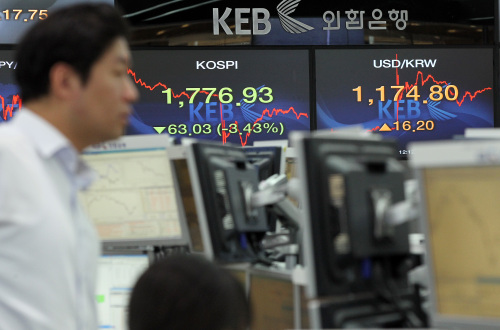Seoul government sets up emergency teams to monitor markets
The Korean financial market tumbled on Monday following news of the death of North Korean leader Kim Jong-il, and analysts offered mixed views about its impact on the Korean economy.
Shortly after Kim’s death was delivered on major networks in South Korea, the main index KOSPI retreated sharply, reflecting concerns that it would affect the Korean market.
Analysts said the short-term shock from Kim’s death was inevitable, as the country’s economy and politics are intricately intertwined, and North Korea has long been cited as a risk factor. But they said its long-term effect might depend on the developments in North Korea’s leadership change.
“Many factors are at work” said Kim Se-joong, chief analyst at Shinyoung Securities. “The stock market here is bound to be affected in the short term.”
Other analysts similarly point out that local investors should brace for a rough ride in the coming days in relation to the death of Kim Jong-il.
 |
(Yonhap News) |
Solomon Investment & Securities said that risks might come from the political side.
“Back in 1994 when Kim Il-sung died, both the KOSPI and KOSDAQ did not move much, but the current North Korean situation involving heir apparent Kim Jong-un is very unstable,” the brokerage said.
Given that North Korea has often resorted to violent measures to divert the attention of its people toward other topics such as confrontation with South Korea, Kim Jong-un’s planned ascendancy might come with some provocative acts, a risk that could hurt the South Korean financial markets.
At the same time, the eurozone debt crisis is still playing out with no sign of immediate conclusion. The double whammy of North Korea risk and the eurozone crisis is a concern for both policymakers and investors, analysts said.
Song Sang-hoon, chief analyst at Kyobo Securities, said the KOSPI’s movement will be affected by how the new leadership structure in North Korea will take shape.
In the long term, foreign investors are now being given another reason to sell Korean stocks in addition to the eurozone problem. Many foreign investors are expected to remain cautious about the South Korean market until the geopolitical risks begin to stabilize.
As for the real economy, the South Korean government is taking countermeasure to minimize the fallout. The Finance Ministry set up an emergency monitoring team to keep tabs on the latest developments related to North Korea and devise fast responses.
Vice Finance Minister Shin Je-yoon said, “The government’s emergency economy task force team will keep an eye on the real economy situations and other factors.”
Shin said Korea needs international cooperation, such as with the U.S., Japan, China and G20 countries.
The Bank of Korea held a contingency meeting of high-ranking officials on Monday, and decided to set up and run an emergency team to monitor the stock, bond and foreign exchange markets at home and abroad.
Financial Services Commission Chairman Kim Seok-dong said that Kim’s death would not pose a serious threat to Korea’s real economy.
“The FSC will form an emergency response team to work with the Finance Ministry and the Bank of Korea through hotlines,” Kim said.
Business associations also expressed their views concerning Kim Jong-il’s death on Monday, urging the government to come up with countermeasures to prevent Kim’s death and subsequent developments from destabilizing South Korea’s real economy.
“Any negative impact from the death of Kim Jong-il should be avoided as far the South Korean economy is concerned, and the Korean government should take steps to cope with the situation,” said the Federation of Korean Industries in a statement.
The Korea Employers Federation said people in the business sector should continue to do their jobs properly while the government should make sure Korean society is shielded from additional chase and instability.
The Korea Chamber of Commerce & Industry said in a statement that maintaining security is important: “The Korean government and the armed forces should strengthen the military preparedness against any developments in North Korea, while strengthening the alliance with neighboring countries for the safety and peace on the Korean Peninsula.”
By Yang Sung-jin (
insight@heraldcorp.com)








